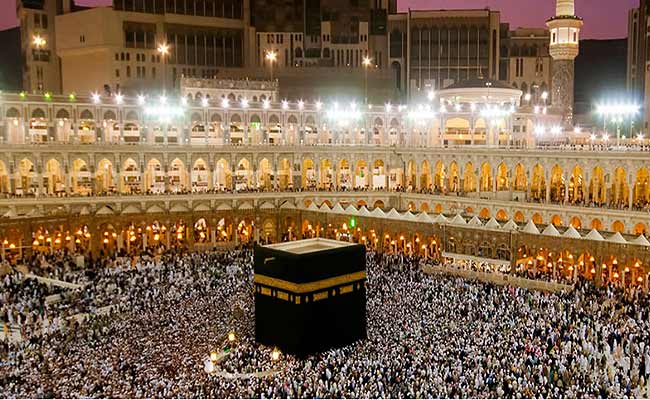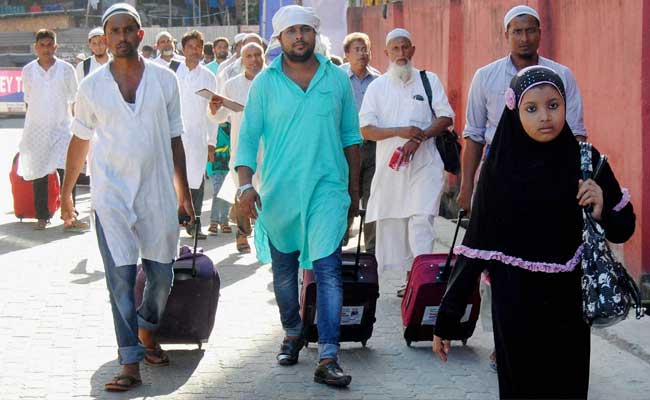Announcing the government's decision to abolish the Haj subsidy, Minority Affairs Minister Mukhtar Abbas Naqvi said the decision is in accordance with a 2012 Supreme Court order. He also said "It is part of the Modi government's efforts to empower minorities with dignity and without appeasement."
If the end of government subsidies for individual pilgrims traveling to Mecca brings back dignity to Muslims, why not bring back dignity to Hindus? Why give subsidies to Hindu pilgrims? If it is appeasement to subsidize pilgrims to Mecca, is it empowerment to subsidize pilgrims to Mansarovar, Ayodhya and other such places considered holy by Hindus?
Within a week of taking over as Chief Minister of Uttar Pradesh, Yogi Adityanath announced a big hike in the subsidy for the pilgrimage to Kailash Mansarovar to upto one lakh rupees per yatri. The Rajasthan Government also provides a similar subsidy. The Madhya Pradesh Government provides a range of subsidies, including for senior citizens, to Ayodhya and Mathura and further afield to those travelling to temple destinations in Sri Lanka, Kampuchea and Pakistan. Other state governments which give such subsidies to individual Hindu pilgrims in organized yatras to identified religious destinations are Chhattisgarh, Karnataka, Haryana, Tamil Nadu; more recently, Delhi has in a new scheme increased the subsidy to individual senior citizens participating in religious yatras. These subsidies range from 25,000 rupees to one lakh rupees given to individual pilgrims. This is apart from the other general arrangements made.

Haj subsidy, besides cheaper fares on Air India, also included help to pilgrims to reach specially-designed Haj departure terminals at airports, food and medical care
The Supreme Court order referred to by the Minority Affairs Minister was concerning funds for individual pilgrims. However, the order gave a ten-year period to the government to phase out the subsidies to Haj pilgrims. It stated "(we) direct Central Government, progressively reduce amount of subsidy so as to completely eliminate it within a period of ten years from today..." which would be May 2022. But the central government has terminated the subsidy for Haj completely within five years, which is a violation of the Supreme Court directions, even as state governments headed by the BJP-RSS are increasing subsidies for Hindu pilgrims.
It is these conflicting and contrasting policies on an issue of state subsidies for religious activities which underline the arbitrary and motivated nature of the decision to terminate the Haj subsidy.
As far as the May 2012 Supreme Court judgement on the Haj is concerned, contrary to the claim of the minister, it had nothing to do with constitutional issues. The two-member bench of Justice Altaf Alam and Justice Ranjana Desai were hearing a bunch of petitions from private travel operators who were aggrieved by certain orders issued by the then union government setting down conditions for their registration. The Bombay High Court had stayed the government orders and it was the union government which approached the Supreme Court in a petition to lift the stay. The issue of the abolition of Haj subsidy was not asked for by the petitioners or by the union government. It was entirely extraneous to the matter at hand and was a most unexpected direction of the court. But even while giving such a direction, the court held that giving such a subsidy "was not unconstitutional."

Days ago, the government also allowed Muslim women above 45 to go on Haj without male company, in a group of at least four
One may not agree with this judgement, but it clearly treats all pilgrims equally regardless of the religion they may believe in. But the government has ignored this judgement. This is the second such example within a month when the government has misread and misused a Supreme Court judgement to further a narrow agenda of targeting the minority community.
On the talaq-e-biddat judgement, the government brought a bill to criminalize triple talaq in the name of the Supreme Court when the court had not in fact suggested any such step even while it set aside this abhorrent practice. The bill has draconian features which gives the government and the police the power to target, charge and arrest Muslim men on a complaint by a third party who may have nothing to do with his victimized wife. Even while it professed its concern for the rights of Muslim women, the government was simultaneously moving towards relaxing the laws on domestic violence under Sec 498A linked to dowry and mental and physical harassment against women by diluting its provisions. While talaq-e-biddat is proposed to be a non-bailable crime, the present law against violence on dowry demands is sought to be changed to make it bailable. Why these double standards? Similarly, in the present case of Haj subsidy, the government has distorted the Supreme Court judgement to abolish the Haj subsidy while at the same time it is increasing subsidies for pilgrims of the majority community. Again, why these double standards?
The secular principle of the separation of the state from religion means that the government should phase out subsidies to all individual pilgrims across religions. This should not be confused with the government's responsibility to provide security and other infrastructural facilities on occasions where large numbers of pilgrims congregate. In no case should the government discriminate among pilgrims of different communities in its approach. But in selectively abolishing the Haj subsidy while increasing and promoting other such subsidies, this is precisely what the Modi Government is doing.
(Brinda Karat is a Politburo member of the CPI(M) and a former Member of the Rajya Sabha.)
Disclaimer: The opinions expressed within this article are the personal opinions of the author. The facts and opinions appearing in the article do not reflect the views of NDTV and NDTV does not assume any responsibility or liability for the same.


